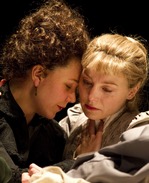SITE GUIDE
SEARCH
REVIEWS
REVIEW ARCHIVES
ADVERTISING AT CURTAINUP
FEATURES
NEWS
Etcetera and
Short Term Listings
LISTINGS
Broadway
Off-Broadway
NYC Restaurants
BOOKS and CDs
OTHER PLACES
Berkshires
London
California
New Jersey
DC
Connecticut
Philadelphia
Elsewhere
QUOTES
TKTS
PLAYWRIGHTS' ALBUMS
LETTERS TO EDITOR
FILM
LINKS
MISCELLANEOUS
Free Updates
Masthead
A CurtainUp Review
Three Sisters
By Elyse Sommer
|
. . .please let us go to Moscow. I beg you, please! There's no place in the world like Moscow. —Irina, like her sisters is dreaming a dream doomed to remain ufulfilled by their failure to overcome their inertia about making their wishes come true. Their brother too ends up a victim of the family intertia, summing up the play's leitmotiv as follows: "Oh where has it gone? What's become of my past when I was young and gay and clever, when I had beautiful dreams and was full of ideas, and the present and the future were bright with hope? Why do we become so dull, so ordinary, so uninteresting, almost before we've begun to live?" |

l-r: Maggie Gyllenhaal (Masha) and Juliet Rylance (Irina)
(Photo: Joan Marcus ) |
Director Austin Pendleton and set designer Walt Spangler have transformed the Classic Stage Company's playing area into the Prozorov family's home in a provincial town. It's a spacious, handsomely furnished and brightly lit place with a giant table elegantly set for a lunch to celebrate the twentieth birthday of Irina (Juliet Rylance), the youngest Prozorov sister. But the beautifully appointed table, and the gorgeous flowers all over the place can't change the one fact that drives the plot: This isn't Moscow and while they try to get into the birthday party spirit, no party can bring them joy unless it's in Moscow, the city they equate with happiness and intellectual fulfillment.
Given the play's many revivals as well as its being required reading for many drama classes, a new production is unlikely to offer any surprises — except for the play's amazing ability to still make its characters and even the many by now familiar lines to enthrall when directed and cast as superbly as it is here. Just in case you don't know the play, here's the plot boiled down to its essentials: Chekhov follows the cultured Prozorov family over several years in small town far from the Moscow where they all yearn to return. The sisters each experience fundamental events that will change their lives. Spinster Olga is drawn further into her work as school administrator. Unhappily married Masha falls in love with Lt. Colonel Vershinin (Peter Skarsgaard). Idealistic Irina seeks out a happy alternative to the Moscow dream with the socially forward looking Baron Tuzenbach. Brother Andrey falls in love with Natasha, a town girl. But, this being a tragedy, none of these events turn out happily.
The quality of Austin Pendleton's flavorful Three Sisters owes much to the individual and ensemble work of the cast he's assembled. It includes some of the standouts from the Uncle Vanya he staged at CSC three years ago. The Vanya veterans include Maggie Gyllenhaal and her real-life husband Peter Sarsgaard, she as the moody Masha and he as the amusingly given to philosophizing Vershinin. She's at her most powerful when she realizes the hopelessness of her love and collapses at Vershinin's feet. Louis Zorich who took up residence on the Serebryakov estate in Uncle Vanya, is now Chebutyikin, an army doctor and the Prozorov's boarder whose repeated "What Difference Does it Make?" catches on with the others so that it crops up 21 times during the course of the play.
The actors all clearly delineate their characters and approaches to life: Jessica Hecht, one of the contemporary theater's best character actors and Juliet Rylance, one of its rising stars, stand out as as the oldest and youngest sisters Olga and Irina. Josh Hamilton is well cast as their younger brother Andrey though Marin Ireland is a bit too shrill and un-Russia n as Natasha, Andrey's humble-into-horrible shrew of a wife. Ebon Moss-Bachrach as Irina's eager-to-embrace modernity suitor and James Patrick Nelson as Masha's all too forgiving husband are also quite good; in fact, all the actors in the minor roles perform with characteristically committed professionalism.
Much of the credit for the production's excellence belongs to Austin Pendleton's astute direction which brings out Chekhov's genius for inhabiting his plays with well-rounded portraits of all his characters — the variously disillusioned men as well as the women. The use of Paul Schmidt's translation which has become known as "Chekhov in American" makes Chekhov's language lively and colloquially conversational.
Best of all, Pendleton has rectified a flaw in his Uncle Vanya by taking advantage of the bright, open playing area to move his actors around to avoid obstructed views by people sitting in the side sections of the thrust theater. Given the intimacy of the theater and the thrust seating, the opened up stage brings the viewer up close to the characters. This sense of proximity is especially effective during some of the private moments at the edge of the bustling main playing area — notably a scene showing the sexual sparks igniting between Masha and Vershinin and a quite different one-on-one which has Irina in the same spot as Masha, but repulsed by Solyony's unwelcome declaration of love.
Not to be overlooked when handing out bravos are the breathtakingly lovely stage pictures. The scenery, lighting, soundscape and costumes are all stars in their own right here.
Just watch that invitingly appointed dining table turn into the base for the increasingly cramped upstairs quarters of the Prozorov home after the first intermission, and finally propped up against the upstage wall as the whatever hopes have been stirred collapse and the officers who have brought a semblance of Moscow-like sociability to the bored sisters are about to leave the town. It's a most impressive example of how a very simple scenic design can support plot development.
Invariably, listening to the sisters kvetching about getting to Moscow prompts the urge to tell them that it wouldn't make any difference if they did get back to that city of their dreams since it's their inertia that dooms them to gloom and despair rather than where they live. After all, just as no one is shackling them to the remote little town, there's no reason why they can't just tell their controlling sister-in-law "no, you can't make us cede our room to your child!" And yet we exit the theater, not impatient but moved by the indelible image of the sisters which leaves no doubt as to their fierce devotion to each other — an emotional port in the sea of their disappointments.
For more about Chekhov's own all too brief life (he died at 44) of longing for Moscow, and links to other productions of his work we've reviewed, see our Chekhov backgrounder.
| Three Sisters By Anton Chekhov Translated by Paul Schmidt Directed by Austin Pendleton Cast (in order of appearance): Jessica Hecht (Olga), Juliet Rylance (Irina), Louis Zorich (Chebutykin), Ebon Moss-Bachrach (Tuezenbach), Maggie Gyllenhaal (Masha), Anson Mount (Solyony), Roberta Maxwell (Anfisa), George Morfogen (Ferapont), Peter Sarsgaard (Vershinin), Josh Hamilton (Andrey), Paul Lazar (Kulygin), Marin Ireland (Natasha), Gabe Bettio (Rohde), James Patrick Nelson (Fedotik). Set design: Walt Spangler Costume design: Marco Piemontese Lighting design: Keith Parham Original music and sound design: Christian Frederickson and Ryan Rumery Hair design: Paul Huntley Stage Manager: Timothy R. Semon Running Time: 2 hours and 40 minutes with 2 intermissions Classic Stage Company (CSC) 136 East 13th Street www.classicstage.org or (212) 352-3101 From 1/12/11;opening 2/03/11; closing 2/20/11-- extended even befoer opening to 3/06/11 Reviewed by Elyse Sommer at January 28th press preview |
|
REVIEW FEEDBACK Highlight one of the responses below and click "copy" or"CTRL+C"
Paste the highlighted text into the subject line (CTRL+ V): Feel free to add detailed comments in the body of the email. . .also the names and emails of any friends to whom you'd like us to forward a copy of this review. Visit Curtainup's Blog Annex For a feed to reviews and features as they are posted add http://curtainupnewlinks.blogspot.com to your reader Curtainup at Facebook . . . Curtainup at Twitter Subscribe to our FREE email updates: E-mail: esommer@curtainup.comesommer@curtainup.com put SUBSCRIBE CURTAINUP EMAIL UPDATE in the subject line and your full name and email address in the body of the message. If you can spare a minute, tell us how you came to CurtainUp and from what part of the country. |

Slings & Arrows-the complete set
You don't have to be a Shakespeare aficionado to love all 21 episodes of this hilarious and moving Canadian TV series about a fictional Shakespeare Company






